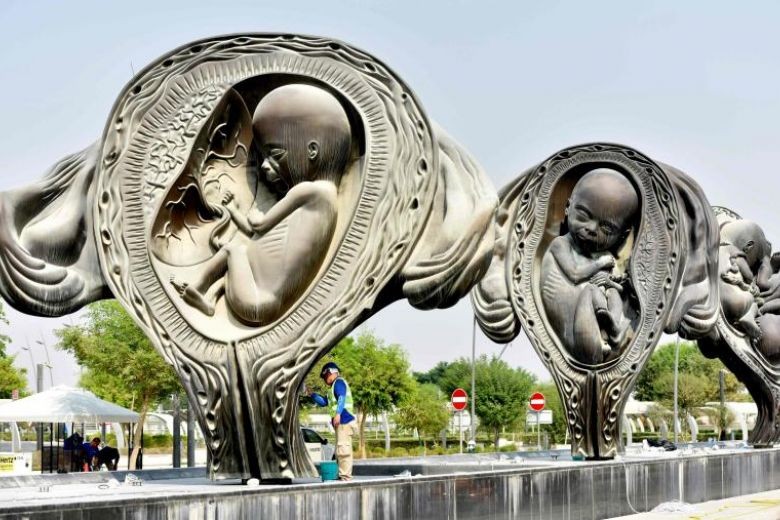Giant Damien Hirst uterus sculptures catch eye at Qatar hospital

DOHA - Fourteen giant bronze sculptures by British artist Damien Hirst graphically charting the moment of conception to birth greet patients arriving at a US$8 billion (S$11 billion) hospital in Gulf state Qatar.
The vast open-air installation, named The Miraculous Journey, shows a foetus growing in the womb and culminates with a 14m sculpture of a naked baby just after birth.
The monumental work is the centrepiece of an impressive modern art collection at the Sidra Medicine Hospital, officially opened this week in Doha, that would be the envy of many galleries around the world.
"We believe it reflects very much the mission of Sidra, taking care of the healthcare of woman and babies," said Ms Layla Ibrahim Bacha, art specialist with the government-supported Qatar Foundation, which owns most of the artwork.
"I think it's perfect for the location, as you can see a lot of people are taking pictures, I think it's becoming iconic."
Also among the 65 works at the speciality facility for children's and women's health are pieces by high-profile international names and artists from across the Arab world, including Qatar.
A fourth-floor outpatient clinic is decorated with a neon installation entitled I Listen To The Ocean And All I Hear Is You by Tracey Emin, one of Hirst's groundbreaking contemporaries from Britain.
Ms Bacha says the art was chosen with "very specific themes" in mind.
"They are not meant to be decorative, they are meant to be creating debates, helping the patient to keep calm," she said.
Syrian artist Jaber al-Azmeh, whose pictures hang in the hospital, told AFP that it makes him smile to imagine his photographs on display in a place where new lives are starting.
Sidra began receiving its first patients in January, and last month, successfully conducted Qatar's first conjoined twin separation surgery.
Energy-rich Qatar has become a major buyer of contemporary art.
It is seeking to portray itself as one of the most progressive states in the region against the backdrop of a bitter stand-off with Gulf rivals led by Saudi Arabia.
But that does not mean there has not been some controversy over the Hirst works towering outside the hospital.
The sculptures were originally unveiled in October 2013 but then covered from public view until recent weeks.
The official reason was to protect them from ongoing building work on the hospital, but they were concealed after a social media outcry.
"We are not expecting everyone to like them. We are not expecting everyone to understand them," said Ms Bacha.
"This is why they are there - to actually create this element of debate, this element of thinking."